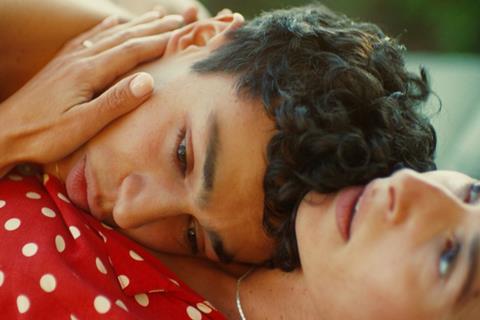A wealthy socialite seduces a teenage asylum seeker in elegantly uncomfortable Karlovy Vary competition title

Dir: Nina Knag. Norway. 2025. 105mins.
As a high-school teacher and pillar of her small Norwegian community, 48-year-old Eva (Pia Tjelta) has what appears to be a gilded life. She is married to Jostein (Kristoffer Joner), the mayor of their picturesque town on the edge of a fjord, and she enjoys her elevated status. But then she meets Amir (Tarek Zayat), an 18-year-old Syrian asylum seeker, at the refugee support centre where she volunteers. Before long, the spark between them ignites into a full-blown affair. Viewed from Eva’s perspective, it is an all-consuming reciprocal passion. But then Nina Knag’s elegantly uncomfortable feature debut pulls back to reveal more, prompting questions about abuse of power and the oblivious self-absorption that comes with privilege.
A multilayered portrait of a complex woman
Knag, whose previous work includes several short films and music videos, plus extensive credits as a casting director, creates a multilayered portrait of a complex woman who, initially at least, generates a degree of sympathy within the audience. That soon evaporates as Eva’s behaviour becomes increasingly controlling and the imbalance of power between her and Amir grows painfully clear. This is intelligent, grown-up filmmaking that may at times feel formally conventional, but does not shy away from deeply ugly aspects in the poised central character nor from tackling provocative themes. In this, it has a kinship with Lilja Ingolfsdottir’s Loveable, which won two prizes in Karlovy Vary competition last year.
In a satisfying structural device, Knag bookends the film with the same scene: Jostein has just won the mayoral election, securing four more years in power, and toasts his wife during a jubilant acceptance speech. The camera rests on Eva’s face. But what seems at the start of the picture to be a modest half-smile takes on a darker timbre when the scene is repeated at the film’s close. It is the expression of a woman who is eaten up inside with guilt over what she has done. Tjelta’s terrific, committed performance digs deep into a character in the grip of an infatuation, whose self-immolation threatens to destroy every life that she touches.
The choice of location – the exteriors were shot in the town of Odda – adds to the film’s sense of discomfort. It is a strikingly beautiful place, and yet there is something oppressive about the looming mountains that frame the town and the moody waters of the fjord. The size of the community is also a factor. Everyone knows everyone, and it is a tricky place to keep a secret. The agile, handheld camera of cinematographer Alvilde Horjen Naterstad tunes into the loaded glances and mercurial shifts in the social and emotional temperature.
At first, the lens is preoccupied with the frisson of obvious attraction between Eva and Amir. She is reeling from her husband’s infidelity, and feels seen for the first time in a long while. And he responds to the fact she looks at him as a man rather than a migrant statistic. But later, as Eva grows reckless in her desire and proprietorial in her attitude towards Amir, the camera catches the smirks and raised eyebrows of her friends and neighbours.
As Amir, Danish actor Zayat fleshes out a character who, by necessity, is something of an enigma. Amir guards some of the facts about his background, hiding behind a false story. And since he, like the rest of the story, is viewed through Eva’s eyes, we get a perspective of him distorted by her obsessive passion. It is his talent as a writer – he turns in a heartfelt poem as an assignment in her language class – which initially catches Eva’s attention. When she offers Amir a room in her house to keep him from being relocated to a different migrant centre, she tells herself it is because she wants to nurture his gift. But as the boundaries between them break down, she chooses not to acknowledge that everything she offers him – the home, the support with his residency application – leaves a transactional stain on the relationship.
There is an inevitability to the messy ending of the relationship, but we are not prepared for the extent of Eva’s self-serving ruthlessness when her position of privilege is threatened. She may get to cling to her status as the First Lady of her town, but she has to live with the appalled stares of the former friends who know her secret.
Production company: The Global Ensemble Drama
International sales: REinvent Studios ida.storm@reinvent.dk
Producers: Eléonore Anselme, Ingrid Skagestad
Screenplay: Nina Knag, Kathrine Valen Zeiner
Cinematography: Alvilde Horjen Naterstad
Production design: Fredrik Sivertsen
Editor: Vidar Flataukan
Main cast: Pia Tjelta, Tarek Zayat, Kristoffer Joner, Kathrine Thorborg Johansen

















![[L-R]: Amanda Villavieja, Laia Casanovas, Yasmina Praderas](https://d1nslcd7m2225b.cloudfront.net/Pictures/274x183/6/4/1/1471641_pxl_20251224_103354743_618426_crop.jpg)



